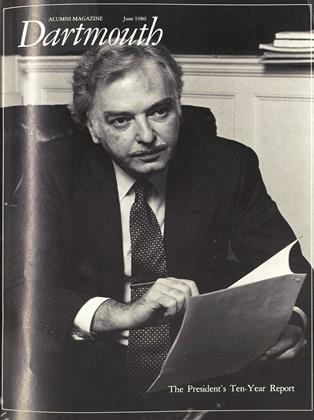Alden Richardson Hefler '25. Jack of All Trades: An Autobiography. Annapolis, Maryland, 1978. 123 pp. Illustrated. Small wonder Hefler was moved to set down his autobiography. His has been no routine, nine- to-five life. He has seen it all, done it all: deckhand on a banana boat to Central America and cattle boat to Europe, high school principal in Maine, saxophone player, professor of French at the U.S. Naval Academy, amateur actor, boat-builder, skipper of Atlantic racing yachts. He holds a master's license in the Merchant Marine, a commercial airplane pilot's license, and a Ph.D. in Romance languages. Mostly he's a sailor and, true to the breed, tells a good yarn. A sailorly exaggeration here and ther6 maybe, but a good yam, especially when he talks about yacht racing. The chapters on Dartmouth evoke an earlier, more rugged time when undergraduates were not content merely to ski down Tuckerman's Ravine of a February but also chose to slide down the headwall on the seat of their pants. Skeptical readers are referred to p. 34.
Gerald D. Martin and William C. Clay Jr. '37. How to Win Maximum Awards for LostEarnings: A Guide to Estimating DamagesFairly and Proving Them in Court. Executive Reports Corp., 1980. Looseleaf, ca. 175 pp. Prepared by attorneys and designed for their colleagues, namely trial lawyers who repre- sent plaintiffs in personal injury and wrongful death liability cases. "This guide," the authors write, "takes you step-by-step through the preparation of a lost earnings ap- praisal that will be accurate and persuasive, and will result in larger awards. ..." Author of a recent book on estate planning, Clay practices law in Mt. Sterling, Kentucky.
Leon Martel '55. Lend-Lease, Loans, and theComing of the Cold War. Westview, 1979. 304 pp. This book is the first, says Martel, "to discuss in detail the implementation phase of policy decisions." Its general aims are two: to arrive at "a better understanding of why and how foreign policy decisions are affected by their implementation" and "to suggest what can be done to make implementation more consistent with desired outcomes." Specifically, it examines four major decisions made by the United States government at the end of World War II: President Truman's decision to cut back lend-lease aid to the Soviet Union after the surrender of Germany; a subsequent decision, after the surrender of Japan, to eliminate all lend-lease aid to Russia; the United States' refusal of a Soviet request in 1945 for $6 billion in long-term credits for postwar reconstruction; and the negative response to a second request for assistance made by Russia in late August of 1945. Because they were ineptly implemented, Martel argues, these four decisions, taken together, gave "a stronger signal of U.S. at- titudes than was intended by the Truman Ad- ministration" and thus laid the foundations for the Cold War which, from Martel's point of view, seems less "a result of the deliberate intentions of U.S. and Soviet leaders than . . . a consequence of the actions of those who processed their decisions." Martel is ex- ecutive vice-president of the Hudson Institute.
H. G. Moser '6O. Dawn Fish: Translations ofan Earthling. Libra, 1979. 162 pp. A research biologist by profession, Moser is also a poet of both wit and precision. This is his second volume of poems. As in the first (Love Dust, 1977), he demonstrates his mastery of the short form, particularly the haiku: Tense HaikuLiving in the presentis like straighteningout your cornucopia. He also continues with another short form of his own devising called the "lattice poem," which, as he told us in his first book, has "a primary, secondary, and tertiary structure that is analagous to the infrastructure of a molecule and should vibrate in and out of focus." Since a lattice poem requires an entire book-size page, interested readers must look for themselves.
Article
-
 Article
ArticlePROFESSOR A. H. WASHBURN REPRESENTS U. S. AT HAGUE
February, 1923 -
 Article
ArticleYouthful at 91
November 1940 -
 Article
ArticleDartmouth Students Again
August 1942 -
 Article
ArticleCLUB CALENDAR
NOVEMBER 1989 -
 Article
ArticleStudents Rate the College
Nov/Dec 2010 -
 Article
ArticleFootball Gains Perfection While Michigan Gains a President
JANUARY 1997 By “E. Wheelock”








